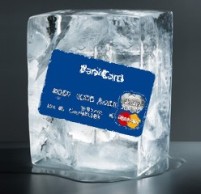Credit Report Freeze/Credit Lock
 Credit report freeze, also known as security freeze or credit lock enables you to block access to your credit reports and scores. When you put a security freeze with the credit bureaus, they are not allowed to disclose your credit reports and scores to NEW lenders, creditors or any other entity that requests your information from the credit bureaus.
Credit report freeze, also known as security freeze or credit lock enables you to block access to your credit reports and scores. When you put a security freeze with the credit bureaus, they are not allowed to disclose your credit reports and scores to NEW lenders, creditors or any other entity that requests your information from the credit bureaus.Credit report freeze is often viewed as the most effective way to prevent financial identity theft. If your credit report is frozen, even someone who knows your name, date of birth and Social Security Number
should be stopped from opening new accounts in your name.
According to the FTC, more than 8 million people fall victim to financial identity theft each year. Approximately 15% of all cases of identity theft are cases of new account origination. This form of identity theft occurs when a criminal opens credit in another individual’s name.
Since lenders typically require access to the borrower’s credit report before issuing a loan in the borrower’s name, putting a security freeze on your credit reports at the 3 major credit bureaus blocks the access of potential NEW lenders to your credit information, thus effectively stopping the process of issuing new credit and opening new accounts.
Are there any exceptions?
Yes. Putting a security freeze on your files blocks only access of NEW potential lenders. Those lenders that you already have an existing account with are not blocked, and continue to have access to your information (for purposes of account maintenance and monitoring)
What if I need new credit?
When your credit is frozen, you will not be able to get new credit (Mortgage, car loan, personal loan, credit cards, rental contracts etc) because your potential creditor will not be able to access your file and asses your risk.
However, you can temporarily unfreeze your credit report to obtain new credit and then freeze it again.
What is the difference between Security Freeze and Federal Fraud Alert?
A security freeze is the only tool that actually allows consumers to limit access to their credit reports and scores.
A fraud alert doesn’t block access to your credit reports and scores. It only attaches a warning to them, notifying potential creditors that they must take certain steps to verify a credit applicant’s identity before extending credit.
There are two types of fraud alert under the FACT Act:
- Initial fraud alert that expires after 90 days unless renewed. The very short time period makes this a poor tool for ID theft prevention.
- Extended fraud alert is restricted to consumers that had already been victimized by ID theft, i.e. it’s not a prevention tool.
Neither the initial nor the extended fraud alert stops the release of the credit report or the credit score.
How long does security freeze last?
Security freeze lasts until you remove it.
Does a credit lock affect my credit score?
No. It has absolutely no effect on your score.
How to freeze credit report
Freezing or locking your file with the credit bureaus is fairly simple and can be done online. Each of the 3 major credit bureaus has an online form that you need to fill in order to activate the security freeze. You need to repeat the process for each bureau separately.
When you freeze your credit report you will be given a password or a PIN number. Make sure you keep it because it will be required to lift the credit lock when you’ll want to apply for new credit.
How to unfreeze credit report
Exactly like you freeze it. You will need to enter the PIN number or password you were given when you froze it.
How much does credit freeze cost?
Putting or lifting a freeze usually cost $10. In some states these fees are waived for victims of identity theft.
Do all states have credit report freeze laws?
As of November 13, 2008, forty-eight states and the District of Columbia have a credit freeze law. The states without mandatory credit freeze laws are:
- Alabama
- Michigan
Here are the 3 major credit bureaus’ online credit lock services:
Return from Credit Report Freeze to Credit Reports and Scores Page
Return from Credit Report Freeze to Credit Report 101 Home Page
